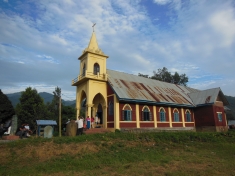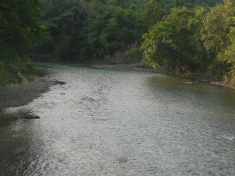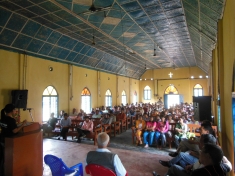Boiled Eggs, Tea and a Fait Accompli
We arrived at Chadong village and went straight to the village headman’s home, on higher ground. It was half 10 in the morning. I recall the time as we were served lunch on arrival. Most families in Manipur – a state in northeast India – wake at dawn, eat soon after, and thus lunch is served well before noon. They have good metabolism given the mountain of white rice that is consumed in their daily diet. Unlike their flatland countrymen, I saw not a single pot-bellied man in the village. But I digress.
Last month, I was invited to Chadong to take part in a seminar on forest rights. On a sunny October Sunday afternoon more than 300 people congregated at the local church.
The first choice location would have been the community hall, but as we walked down from the village headman’s home, one could see the police commandoes using it as a command post. The district has a significant armed presence due to the insurgency in the state; separatist groups for decades have sought to detach from the Union of India. Locals say the armed presence is a smokescreen to steamroll the people’s protests and their demand for justice. As per an official survey, 804 families in six villages including Chadong are to be displaced if the Mapithel Dam on the Thoubal River is commissioned as planned in 2015. The place of worship, built by the villagers and in use since 1982, turned out to be the best alternative venue for this gathering; the villagers need all their strength to deal with the trauma of knowing that their ancestral homes, their farms, the church, their way of life, may all be gone in the not-so-distant future.
The 66-meter-high dam is yet to receive the statutory forest clearance. Approximately 1,215 hectares will be submerged by the dam reservoir, half of it forest. The regional office of the Ministry of Environment and Forests sent notices – first in 2006 and then in August earlier this year – to the state government demanding they seek forest clearance before commencing with the project. On November 12, a National Green Tribunal order – based on the plea that the project is under construction without clearance – put a stay on construction until the next hearing sometime in January, 2014. The state government had attempted to expedite construction, as delays or expenditure beyond the $230 million sanctioned by the Planning Commission would be borne by the state. As of July 31 this year, roughly $200 million had already been spent. It is only after the plea was filed in the National Green Tribunal that the state government applied for the final nod from the environment ministry.

The seminar began as the pastor said a prayer. His words resounded in the church, ending with an individually inaudible but collectively resonant "amen." A village elder and former vice-principle of a public school was invited first to the dais. Other seniors conversant with the case, too voiced their concerns; laws stipulating free, prior and informed consent in recognition of indigenous peoples’ rights to land and forest had been violated, they said. I couldn’t quite follow as everyone spoke in the local Manipuri dialect. A young activist from Imphal seated beside me tried now and then to whisper-translate, but to little gain. Meanwhile my mind wandered, comparing the gathering to other seminars attended in flatland towns and cities. There, food is served as an alluring buffet spread; many attend just to plate up. Press releases aren't given out in advance, else media persons do not show or stay for the meet. And there are so many contrived formalities that half the time is spent in lighting of a lamp, a welcome address, vote of thanks and other such civilities. People often speak as a show of self-worth, rather than having something meaningful to say. There are polarized positions, few compromises. And people network, rarely get to know one another.

My address was brief and translated, seeking to communicate our solidarity with the community and their demand for justice. I recall sharing the untimely loss of my elder brother some years ago as paling in their imminent loss. Those gathered listened, and later asked questions. An odd few sat seemingly wary of me, a “mainland” or “non-Manipuri” Indian. Their uncertain future could be sensed in the knowledge that this very building, the adjacent football field, this stretch of valley home to 804 families would soon be lost to a gush of water if the dam is commissioned as planned in 2015. I also sensed an authoritarian imposition of a "superior" understanding – the government knows what’s best for the people and is doing so in the Nation’s interest. And this could be the story of every large dam project in India, and beyond.
The Mapithel Dam is intended to generate 7.5 megawatts of hydroelectricity and supply 10 million gallons of water each day to the state capital. The villagers say they are not in opposition to the project, given that the dam is now 90% complete. But under the banner of the Mapithel Dam Affected Villages Organization, they are seeking recognition of forest rights, fishing rights and rights to garner tourism revenues after completion of the project. The government though is unwilling to strike a deal with the affected communities – yet.
Later that sunny afternoon, everyone ate a boiled egg and drank tea, reconciled to a fait accompli.



